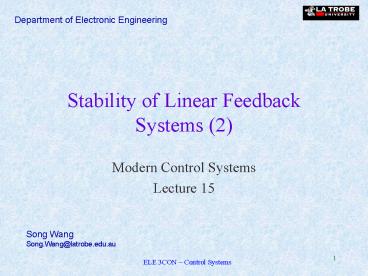Stability of Linear Feedback Systems 2 - PowerPoint PPT Presentation
1 / 12
Title:
Stability of Linear Feedback Systems 2
Description:
ELE 3CON Control Systems. Stability of Linear Feedback Systems (2) ... as the TF model, can be ascertained by using the characteristic equation of the system. ... – PowerPoint PPT presentation
Number of Views:651
Avg rating:3.0/5.0
Title: Stability of Linear Feedback Systems 2
1
Stability of Linear Feedback Systems (2)
- Modern Control Systems
- Lecture 15
2
Outline
- Stability of state variable systems
- Design example
- System stability using Matlab
3
Stability of state variable systems
- Stability of a system modeled in state variable
form, same as the TF model, can be ascertained by
using the characteristic equation of the system.
Having obtained the characteristic equation, we
assess the system stability either through the
Routh-Hurwitz criterion or by finding the roots
of the characteristic equation. The roots of the
characteristic equation must lie in the left half
of s-plane for the system to be stable. - We now investigate how to find the characteristic
equation for state variable systems when the
system is represented by 1) signal-flow graph, 2)
block diagram, or 3) state equation.
4
Characteristic equation of state variable systems
represented by signal-flow graph
- For a signal-flow graph state model, the
characteristic equation is the flow graph
determinant ?, acquired by Masons gain formula. - Consider the signal-flow graph model in the
figure.
Using Masons gain formula, we obtain the flow
graph determinant ?
Thus the characteristic equation is
5
Characteristic equation of state variable systems
represented by block diagram
- For a block diagram model, the characteristic
equation is obtained using block diagram
reduction techniques. - Consider the previous example but represented in
block diagram.
Eliminating the two feedback loops yields G1(s)
and G2(s). The closed-loop TF is then
The characteristic equation is thus
which is same as before.
6
Characteristic equation of state variable systems
represented by state equation
- For state variable systems in state equation, the
characteristic equation can be obtained from the
determinant of (?I-A). That is, the nth-order
equation in ? resulting from the evaluation of
this determinant is the characteristic equation,
expressed by
Again consider the previous example but
represented in state equation form.
?1, ?2,?n are called characteristic roots or
eigenvalues of the system.
The characteristic equation is given by
which is same as before.
7
Design example tracked vehicle turning control
- The block diagram of a tracked vehicle turning
control system is shown in the figure. We want
to select K and a so that the system is stable
and the steady-state error for a ramp command is
less than 24 of the magnitude of the command.
The closed-loop TF of the system is
The characteristic equation is
8
Design example tracked vehicle turning control
(contd)
- The characteristic equation is
We establish the Routh array to determine
stability.
where
For the elements in the first column to be
positive, we require that Ka, b3 and c3 be
positive. Therefore,
9
Design example tracked vehicle turning control
(contd)
Since the error signal where the ramp input
r(t)At for tgt0 and
For ess10A/Ka to be less than 24 of A, Ka
41.7. In addition,
- The region of stability for Kgt0 is shown in the
figure. So if we choose Ka42, then the selected
point in the stable region of K70 and a0.6
satisfies design specifications.
10
System stability using Matlab
- Routh-Hurwitz criterion finds how many poles lie
in the right half plane, but not the specific
location of the poles. With Matlab, we can
calculate the poles explicitly, thus allowing us
to comment on systems relative stability. - The Matlab function to compute system poles is
pole.
11
System stability using Matlab (contd)
- When the characteristic equation is a function of
a single system parameter, Routh-Hurwitz
criterion can be used to determine the range of
values that the parameter may take to ensure
system stability. In this situation, we can
resort to Matlab to verify the result
graphically. In addition, we can use the roots
function to calculate the characteristic roots.
The characteristic polynomial of the system in
the figure is
Using Routh-Hurwitz criterion, we require 0ltKlt8
for stability. We can use Matlab to verify it.
12
System stability using Matlab (contd)
- For state variable systems represented in state
equation form, the characteristic equation is
det(?I-A)0. We can use the poly function to
obtain the characteristic equation associated
with A.
For example, system matrix A is
The associated characteristic polynomial is
If we use poly(A) in Matlab, we can obtain the
same result.































